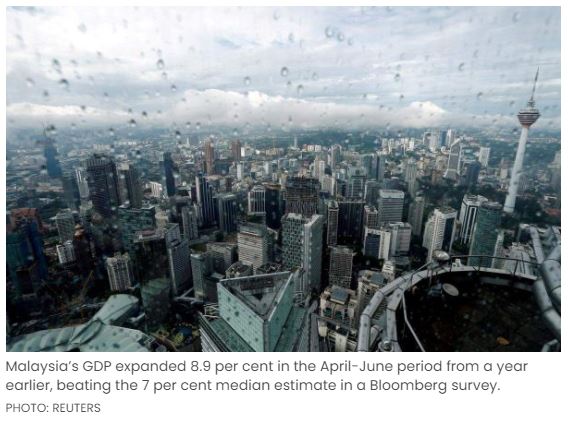Malaysia’s GDP growth to quicken on pent-up demand: finance minister
MALAYSIA’S economic growth will accelerate this quarter after expanding at the fastest pace in a year, driven by private consumption as activities resume, Finance Minister Zafrul Aziz said.
“People are underestimating the strength of the pent-up demand,” he said in an interview on Saturday (Aug 13). “Restaurants are packed, traffic jams have returned, the unemployment rate has fallen to below 4 per cent and the first-half tax collections have been way above our estimate.”
Malaysia’s GDP expanded 8.9 per cent in the April-June period from a year earlier, beating the 7 per cent median estimate in a Bloomberg survey. The economic recovery has also been aided by a boom in overseas trade, with both export and import values hitting records in June. The central bank is projecting full-year growth to be at the upper end of its 5.3-6.3 per cent forecast.
The outlook will be more challenging heading into 2023 because of slowdown fears in the global economy, Zafrul said. Stumbling growth in China – its largest trading partner – and the US Federal Reserve’s aggressive monetary tightening are concerns, Zafrul said.
“There are things that are not in our control,” he said, flagging fears about an escalation in tensions between the US and China after US House Speaker Nancy Pelosi’s visit to Taiwan. “We are hoping that the inflation concerns in the US ease and that China addresses its conservative Covid measures.”
Malaysia’s inflation pressures are expected to remain partly contained because of price caps on food items and fuel subsidies, Zafrul said. The government also recently held off on raising electricity and water prices. The consequence – a subsidy bill for 2022 that will likely total RM80 billion (S$25 billion), versus a budgeted RM31 billion.
“Our inflation has been under control relative to what we see in the rest of the world,” Zafrul said. “But this comes at a high fiscal cost.”
The government will rely on revenues from high commodity prices, robust tax collections, a one-off prosperity tax on companies, and dividends from state entities including Petroliam Nasional and sovereign wealth fund Khazanah Nasional, to offset the subsidy bill, he said.
“The easiest way is to borrow more,” Zafrul said, adding there is scope to do so because the debt-to-GDP ratio of 60.4 per cent is still below the statutory debt ceiling cap of 65 per cent. “But we are committed to a fiscal deficit target at 6 per cent of GDP. Pre-pandemic, our deficit was at 3.5 per cent. We have to get there eventually.”
Fuel subsidies and ringgit
“We are testing the mechanism for the targeted fuel subsidy system at some gas stations. We are testing platforms, including e-wallets, and hopefully will take it to the Cabinet by the year-end. It is up to the Cabinet to decide on its implementation,” Zafrul said.
Subsidies on fuels and cooking gas alone are projected to be about RM37 billion this year, most of which benefit the higher-income groups, according to the finance ministry. The implementation of targeted subsidies will likely be done in stages and after taking into account the prevailing inflation rate, Zafrul said.
“The ringgit has depreciated against the US dollar, like currencies of many other countries have. Ringgit isn’t the only one that has weakened, though some people are spinning it that way,” Zafrul added.
“Apart from Bank Negara Malaysia ensuring the currency fluctuations are not severe, it comes down to the economy’s fundamentals. We need to strengthen them and the ringgit will reflect that. The GDP data validates the recovery.” BLOOMBERG


 Thailand
Thailand




